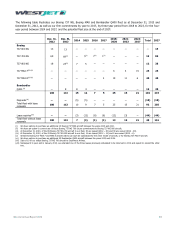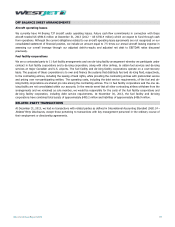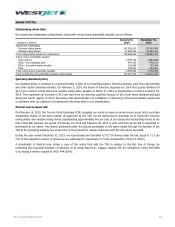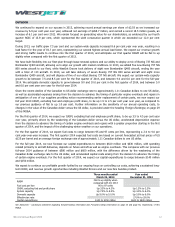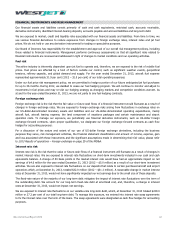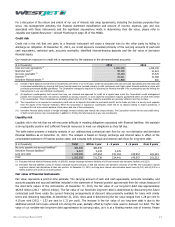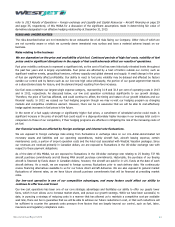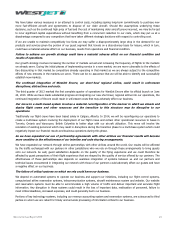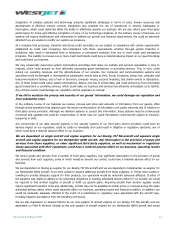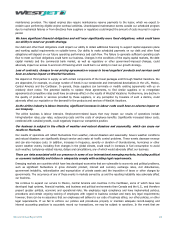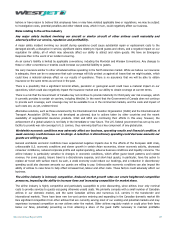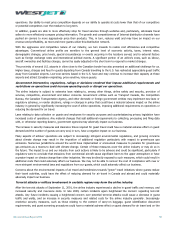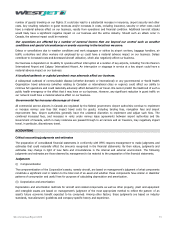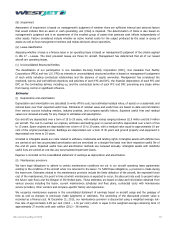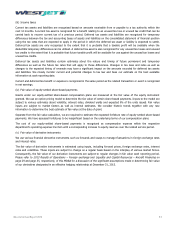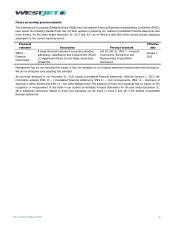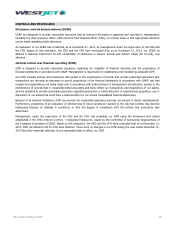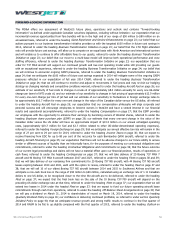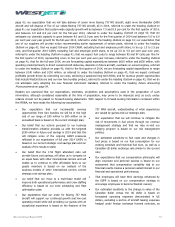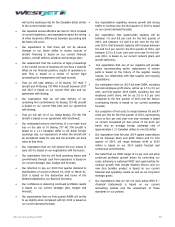Westjet 2013 Annual Report Download - page 48
Download and view the complete annual report
Please find page 48 of the 2013 Westjet annual report below. You can navigate through the pages in the report by either clicking on the pages listed below, or by using the keyword search tool below to find specific information within the annual report.
WestJet Annual Report 2013 48
maintenance provision. The leased engines also require maintenance reserve payments to the lessor, which we expect to
reclaim upon performing eligible engine overhaul activities. Unanticipated maintenance events outside our scheduled program
due to mechanical failures or from directives from suppliers or regulators could impact the amount of costs incurred in a given
period.
We have significant financial obligations and will incur significantly more fixed obligations, which could harm
our ability to meet our growth strategy.
Our debt and other fixed obligations could impact our ability to obtain additional financing to support capital expansion plans
and working capital requirements on suitable terms. Our ability to make scheduled payments on our debt and other fixed
obligations will depend on our future operating performance and cash flow. The failure to generate sufficient operating cash
flow to meet our fixed obligations could harm our business. Changes in the conditions of the equity capital markets, the debt
capital markets and the commercial bank market, as well as regulatory or other government-imposed changes, could
adversely impact our access to and cost of financing which could harm our ability to meet our growth strategy.
Loss of contracts, changes to our pricing agreements or access to travel suppliers’ products and services could
have an adverse impact on WestJet Vacations.
We depend on third parties to supply us with certain components of the travel packages sold through WestJet Vacations. We
are dependent, for example, on a large number of hotels in our transborder and international destinations in the U.S., Mexico,
Central America and the Caribbean. In general, these suppliers can terminate or modify existing agreements with us on
relatively short notice. The potential inability to replace these agreements, to find similar suppliers or to renegotiate
agreements at competitive rates could have an adverse effect on the results of WestJet Vacations. Furthermore, any decline in
the quality of products or services provided by these suppliers, or any perception by travelers of such a decline, could
adversely affect our reputation or the demand for the products and services of WestJet Vacations.
As the airline industry is labour intensive, significant increases in labour costs could have an adverse impact on
our Company.
The airline business is labour intensive. Employment-related issues that may impact our results of operations include
hiring/retention rates, pay rates, outsourcing costs and the costs of employee benefits. Significantly increased labour costs,
combined with curtailed growth, could negatively impact our competitive position.
Our business is subject to the effects of weather and natural disasters and seasonality, which can cause our
results to fluctuate.
Our results of operations will reflect fluctuations from weather, natural disasters and seasonality. Severe weather conditions
and natural disasters can significantly disrupt service and create air traffic control problems. These events decrease revenue
and can also increase costs. In addition, increases in frequency, severity or duration of thunderstorms, hurricanes or other
severe weather events, including from changes in the global climate, could result in increases in fuel consumption to avoid
such weather, turbulence-related injuries, delays and cancellations, any of which would adversely affect our business.
There are risks associated with our presence in some of our international emerging markets, including political
or economic instability and failure to adequately comply with existing legal requirements.
Emerging markets are countries which have less developed economies that are vulnerable to economic and political problems,
such as significant fluctuations in gross domestic product, interest and currency exchange rates, civil disturbances,
government instability, nationalization and expropriation of private assets and the imposition of taxes or other charges by
governments. The occurrence of any of these events in markets served by us and the resulting instability may adversely affect
our business.
We continue to expand our service to Mexico, Central America and countries in the Caribbean, some of which have less
developed legal systems, financial markets, and business and political environments than Canada and the U.S., and therefore
present greater political, economic and operational risks. We emphasize legal compliance and have implemented policies,
procedures and certain ongoing training of employees with regard to business conduct and many key legal requirements;
however, there can be no assurance that our employees will adhere to our code of business ethics, our other policies, or other
legal requirements. If we fail to enforce our policies and procedures properly or maintain adequate record-keeping and
internal accounting practices to accurately record our transactions, we may be subject to sanctions. In the event that we


